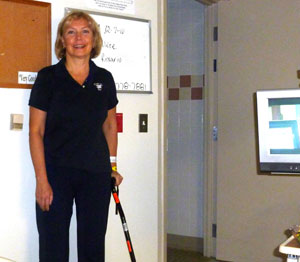
The article cited several studies, including a 2010 study in the journal Stroke that found the stroke rate tripled in 35- to 54-year-old women between 1988 and 2004, and a 2011 Centers for Disease Control and Prevention report that showed hospitalizations for stroke increased by more than a third in 15- to 44-year-olds in the 14-year period that ended in 2008.
“The good news is many contributing risk factors can be minimized with lifestyle changes, such as a healthy diet and exercise,” said Reza Sadeghi, MD, M.Sc., a Mischer Neuroscience Associates neurologist and clinical neurophysiologist affiliated with Memorial Hermann Southwest Hospital, a member of the Memorial Hermann Rehabilitation Network. “However, it is important to see your doctor for regular check-ups and to understand your potential risk for stroke and heart disease.”
At 53-years-old, Valentina Lisinski was busy with life; scuba diving and traveling. While on vacation in South America, she woke up in the middle of the night with numbness on her right side. She was dizzy and unable to speak. Her friend heard her fall and came to her aid.
Because Lisinski was in a remote location, specialized medical treatment for stroke was not readily available. Her husband quickly flew her back to Houston where she was admitted to Memorial Hermann Southwest, designated as a Primary Stroke Center by the Joint Commission. There, Lisinski underwent four weeks of intense stroke rehabilitation; relearning all the basics - how to speak, walk, and eat.
According to the American Heart Association/American Stroke Association, stroke is the leading cause of long-term disability and the fourth leading cause of death in the United States. On average, someone suffers a stroke every 40 seconds, someone dies of a stroke every four minutes, and 795,000 people suffer a new or recurrent stroke each year.
“While the whole situation was extremely scary, I consider myself very lucky. My husband took action immediately to get me to Memorial Hermann where I could get help,” said Lisinski. “Today, I am about 98 percent back to normal, but I am stubborn and still working on total recovery.”
Because stroke injures the brain, you may not realize you are having a stroke. To a bystander, someone having a stroke may just look unaware or confused. Stroke victims have the best chance if someone around them recognizes the symptoms and gets help quickly. The symptoms of stroke are distinct because they happen fast:
- Sudden numbness or weakness of the face, arm, or leg (especially on one side of the body)
- Sudden confusion, trouble speaking, or understanding speech
- Sudden trouble seeing in one or both eyes
- Sudden trouble walking, dizziness, loss of balance or coordination
- Sudden severe headache with no known cause
Memorial Hermann recommends F.A.S.T. as an acronym to remember the sudden signs of stroke: Face drooping, Arm weakness, Speech difficulty, Time to call 9-1-1.
“Within a few minutes of having a stroke, brain cells begin to die and symptoms emerge. It is important for everyone to recognize the symptoms because prompt treatment is crucial to recovery,” said Ajay Bindal, MD, a neurosurgeon affiliated with Memorial Hermann Southwest. “Much of stroke prevention is based on living a healthy lifestyle. This includes identifying and controlling blood pressure, not smoking, treating diabetes properly, and managing stress.”
Memorial Hermann Southwest, affiliated with TIRR Memorial Hermann and a part of the Memorial Hermann Rehabilitation Network, a nationally recognized leader in rehabilitation, features a multidisciplinary, team-based approach to rehabilitation and education. Utilizing innovative, state-of-the-art approaches, each patient receives customized rehabilitation treatment which incorporates personal performance goals. For more information, call 1-800-44REHAB (73422).